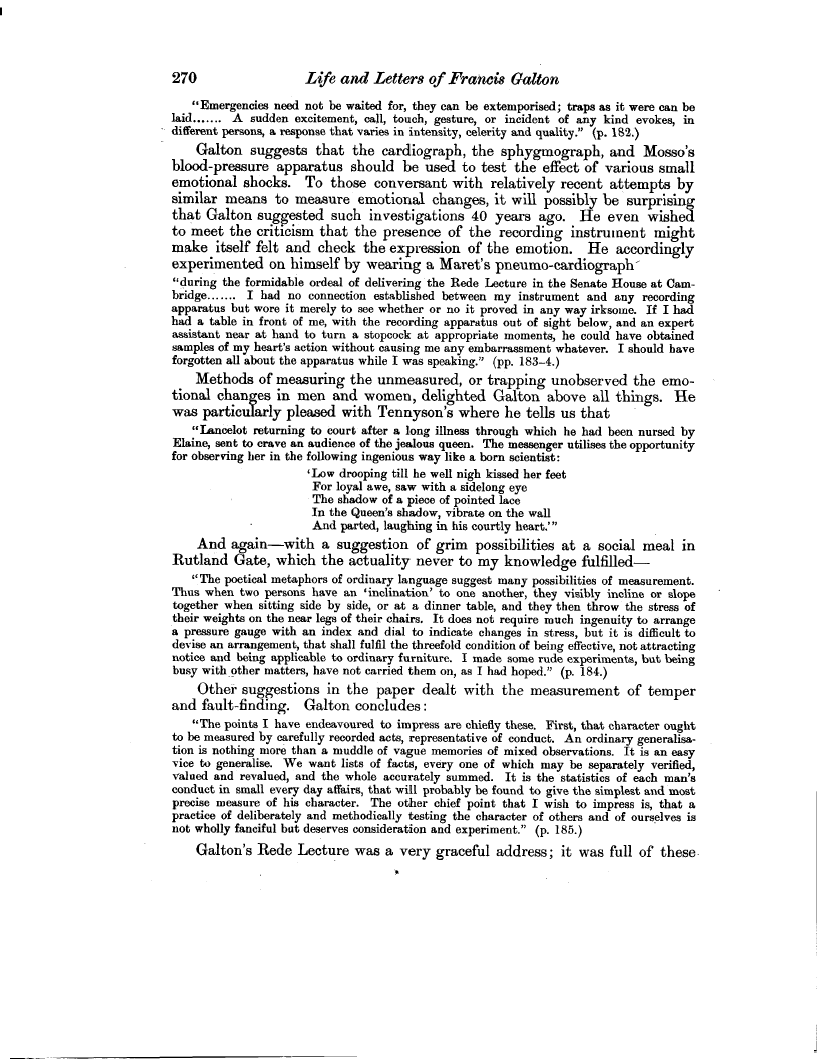270 Life and Letters of Francis Galton
"Emergencies need not be waited for, they can be extemporised; traps as it were can be laid A sudden excitement, call, touch, gesture, or incident of any kind evokes, in different persons, a response that varies in intensity, celerity and quality." (p. 182.)
Galton suggests that the cardiograph, the sphygmograph, and Mosso's blood-pressure apparatus should be used to test the effect of various small emotional shocks. To those conversant with relatively recent attempts by similar means to measure emotional changes, it will possibly be surprising that Galton suggested such investigations 40 years ago. He even wished to meet the criticism that the presence of the recording instrument might make itself felt and check the expression of the emotion. He accordingly experimented on himself by wearing a Maret's pneumo-cardiograph'
"during the formidable ordeal of delivering the Rede Lecture in the Senate House at Cambridge I had no connection established between my instrument and any recording apparatus but wore it merely to see whether or no it proved in any way irksome. If I had had a table in front of me, with the recording apparatus out of sight below, and an expert assistant near at hand to turn a stopcock at appropriate moments, he could have obtained samples of my heart's action without causing me any embarrassment whatever. I should have forgotten all about the apparatus while I was speaking." (pp. 183-4.)
Methods of measuring the unmeasured, or trapping unobserved the emotional changes in men and women, delighted Galton above all things. He was particularly pleased with Tennyson's where he tells us that
"Lancelot returning to court after a long illness through which he had been nursed by Elaine, sent to crave an audience of the jealous queen. The messenger utilises the opportunity for observing her in the following ingenious way like a born scientist:
'Low drooping till he well nigh kissed her feet For loyal awe, saw with a sidelong eye The shadow of a piece of pointed lace In the Queen's shadow, vibrate on the wall And parted, laughing in his courtly heart."'
And again-with a suggestion of grim possibilities at a social meal in Rutland Gate, which the actuality never to my knowledge fulfilled
"The poetical metaphors of ordinary language suggest many possibilities of measurement. Thus when two persons have an 'inclination' to one another, they visibly incline or slope together when sitting side by side, or at a dinner table, and they then throw the stress of their weights on the near legs of their chairs. It does not require much ingenuity to arrange a pressure gauge with an index and dial to indicate changes in stress, but it is difficult to devise an arrangement, that shall fulfil the threefold condition of being effective, not attracting notice and being applicable to ordinary furniture. I made some rude experiments, but being busy with other matters, have not carried them on, as I had hoped." (p. 184.)
Other suggestions in the paper dealt with the measurement of temper and fault-finding. Galton concludes
"The points I have endeavoured to impress are chiefly these. First, that character ought to be measured by carefully recorded acts, representative of conduct. An ordinary generalisation is nothing more than a muddle of vague memories of mixed observations. It is an easy vice to generalise. We want lists of facts, every one of which may be separately verified, valued and revalued, and the whole accurately summed. It is the statistics of each man's conduct in small every day affairs, that will probably be found to give the simplest and most precise measure of his character. The other chief point that I wish to impress is, that a practice of deliberately and methodically testing the character of others and of ourselves is not wholly fanciful but deserves consideration and experiment." (p. 185.)
Galton's Rede Lecture was a very graceful address; it was full of these.

